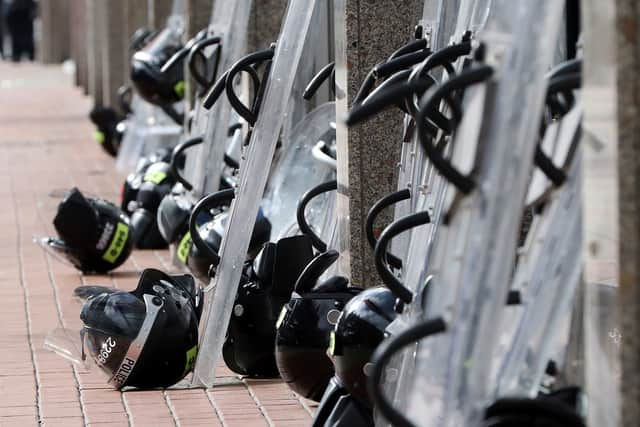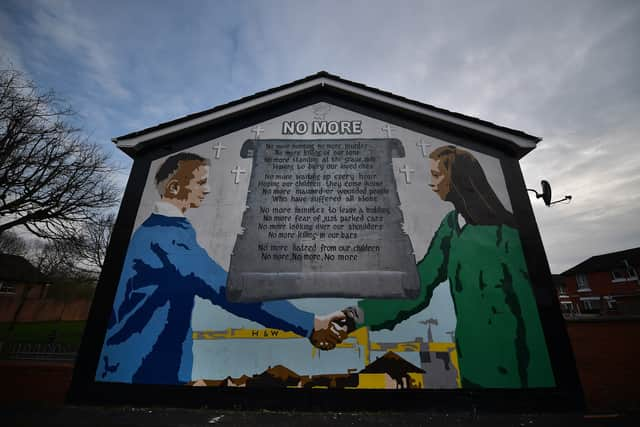Police Service of Northern Ireland warn dissidents may attempt attacks on police on Easter Monday
and live on Freeview channel 276
The Police Service of Northern Ireland (PSNI) have warned they have received “strong” intelligence that dissidents are planning attacks against officers on Easter Monday.
PSNI Chief Constable Simon Byrne said that police officers would be moved to frontline duties to counter any potential threats, in a policing strategy that he said had not been used in years, which reflected the “exceptional circumstances” police were dealing with ahead of the Easter weekend.
Advertisement
Hide AdAdvertisement
Hide AdThe warning comes as Northern Ireland marks the 25th anniversary of the Good Friday Agreement, with US President Joe Biden visiting on Tuesday (April 11), where he is expected to open the new Ulster University campus in Belfast.
The news comes after Northern Ireland’s terror threat level was increased from “substantial” to “severe”, meaning an attack is highly likely. This happened after a series of incidents targeting Northern Ireland security forces, including the attempted murder of Detective Chief Inspector John Caldwell in Omagh in February.
Northern Ireland has been without a government at Stormont since February 2022, despite changes to the NI Protocol and the Windsor Framework, power sharing has yet to be restored. So, what have the PSNI said about the latest threat? Here’s everything you need to know.
What have the PSNI said?
Assistant Chief Constable Bobby Singleton has said the PSNI have received “strong” intelligence that dissidents are planning attacks against officers over the Easter weekend at a press conference in Belfast.
Advertisement
Hide AdAdvertisement
Hide AdSingleton told the conference: “It’s going to be a really significant weekend for the PSNI.” He continued: “There is also very strong community intelligence specifically coming forward in respect of Monday’s events in Derry/Londonderry and a real concern that there may be attempts to draw police in to serious public disorder and to use that then as a platform to launch terrorist attacks on police as well.” He added: “So going into our operation that’s something that is very clearly right at the forefront of my mind, the minds of the commanders that will be delivering that and of course our officers as well.”


PSNI Chief Constable Simon Byrne added that police officers would be moved to frontline duties to counter any potential threats, in a policing strategy that he said had not been used in years, which reflected the “exceptional circumstances”.
Whilst the PSNI Assistant Chief Constable Chris Todd said that there was no specific intelligence that the 25th anniversary of the Good Friday Agreement was acting as additional motivation for dissident republican attacks. Todd said: “We plan for the worst and we hope for the best to be quite frank, we will respond to the intelligence as it develops, we have no such intelligence that would support that at the moment.”
Easter Monday is traditionally when dissident republicans mark the anniversary of the 1916 Easter Rising.
What have politicians said?
Advertisement
Hide AdAdvertisement
Hide AdThe leader of the DUP, Sir Jeffrey Donaldson told BBC Radio 4’s Today Programme that the current situation could not be blamed on the deadlock in Stormont. He said: “While Stormont was sitting for many years these dissident republicans engaged in violence, they murdered police officers.” He continued: “Of course we want to see Stormont fully functioning, but the idea that when we get Stormont back up and running, that dissident republicans will put their guns away, I didn’t hear the chief constable suggest that.” Whilst Sinn Féin’s Gerry Kelly said that dissident republican paramilitaries are “a small number of people intent on reversing the peace process, the political process and all of that for no good reason”.


Reported by PA Media, speaking in Belfast, The Tánaiste (Irelan deputy premier), Michael Martin condemned the threat calling it “criminality in its worst form” adding that it was “very evil people who are contemplating this”. He continued: “I would condemn any attempts by anybody to injure or to attack the PSNI. An attack on the PSNI is an attack on all of us on this island. The police are essential to the security of our people and the PSNI, in my view, are doing a remarkable job under very challenging circumstances.”
He added: “I was listening to PSNI personnel this morning talking about their work in communities. The tremendous progress that has been made in terms of the transformation of policing in Northern Ireland is one of the great dividends of the Good Friday Agreement. I’m resolute in my condemnation of such attacks, as we witnessed on John Caldwell. I think it’s very evil people who are contemplating this – this is criminality in its worse form.”
What is the terror threat level for Northern Ireland?
In March, the terror threat level in Northern Ireland was raised by MI5 from “substantial” to “severe”, which means an attack is highly likely. The threat level had been lowered in 2022, bringing it down for the first time since 2010. The threat level for the rest of the UK remains at “substantial”, meaning an attack is considered “likely”. At the time of the threat level increase, Northern Ireland Secretary Chris Heaton-Harris explained there are a “small number” of individuals who remain determined to use “politically motivated violence”.
Comment Guidelines
National World encourages reader discussion on our stories. User feedback, insights and back-and-forth exchanges add a rich layer of context to reporting. Please review our Community Guidelines before commenting.
